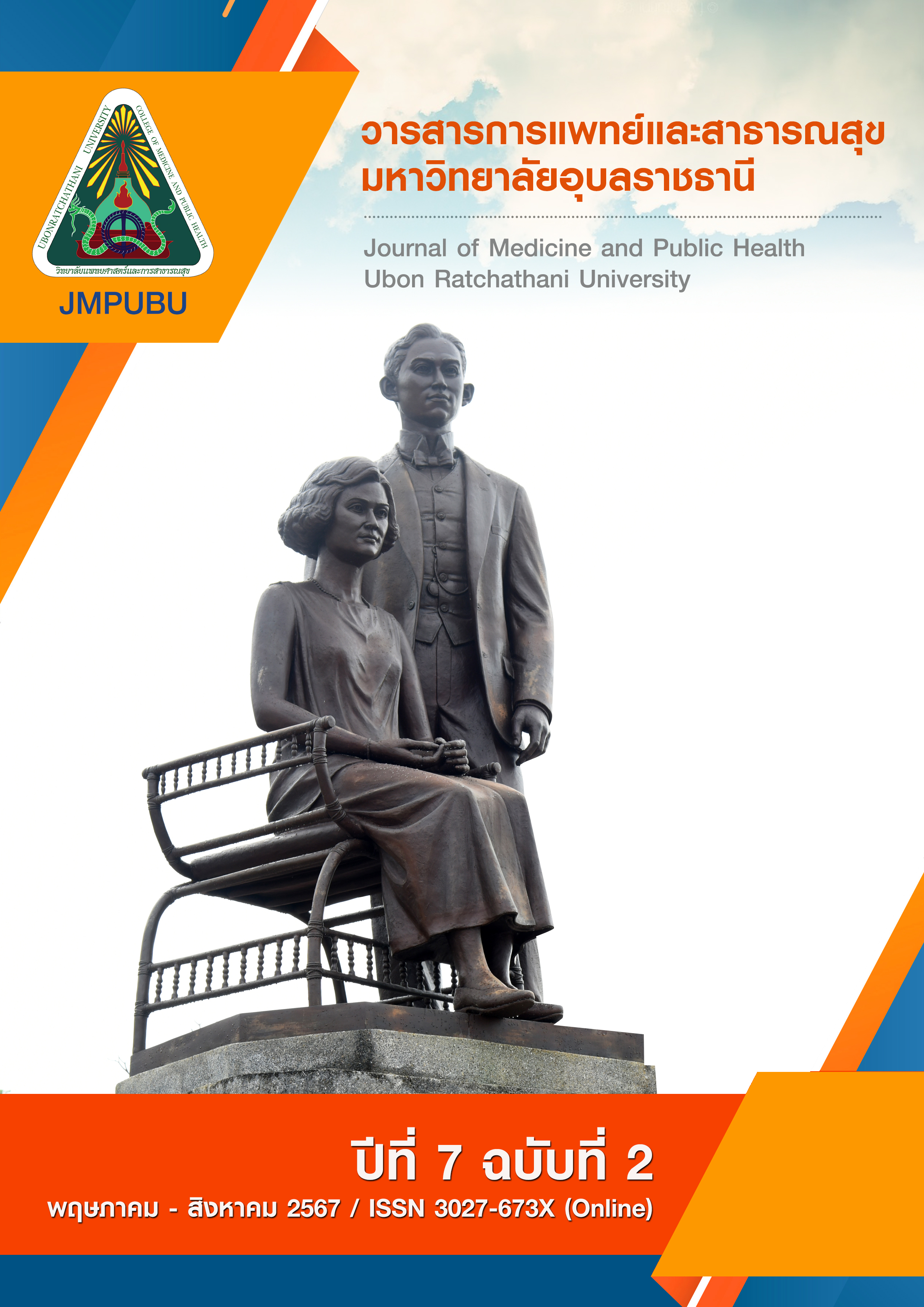ภาวะผัดวันประกันนอน ผลลัพธ์การนอนหลับ และการควบคุมตนเอง ของนิสิตแพทย์กลุ่มสำเร็จการศึกษาระดับปริญญาตรีลาเรียน
คำสำคัญ:
ภาวะผัดวันประกันนอน , การควบคุมตนเอง, นิสิตแพทย์กลุ่มสำเร็จการศึกษาระดับปริญญาตรีลาเรียน, ผลลัพธ์การนอนบทคัดย่อ
การศึกษาครั้งนี้เป็นการศึกษาเชิงพรรณนาแบบตัดขวาง มีวัตถุประสงค์เพื่อศึกษาภาวะผัดวันประกันนอน ผลลัพธ์การนอนหลับ การควบคุมตนเองและศึกษาความสัมพันธ์ภาวะผัดวันประกันนอนกับผลลัพธ์ของการนอนหลับ และการควบคุมตนเอง ของนิสิตแพทย์กลุ่มสำเร็จการศึกษาระดับปริญญาตรีลาเรียน จำนวนทั้งหมด 124 คน จาก 3 ศูนย์แพทย์ ได้แก่ ศูนย์แพทย์ศาสตร์ศึกษาชั้นคลินิก โรงพยาบาลสมเด็จพระเจ้าตากสินมหาราช โรงพยาบาลพิจิตร และโรงพยาบาลแพร่ เก็บข้อมูลในช่วงเดือนสิงหาคม พ.ศ. 2565 ด้วยแบบเก็บข้อมูลออนไลน์ที่ดัดแปลงจากแบบบันทึกการผัดวันประกันนอน วิเคราะห์ข้อมูลด้วยสถิติเชิงอนุมาน ได้แก่ สถิติทดสอบไคสแควร์ ที่ระดับนัยสำคัญทางสถิติ 0.05 ผลการศึกษาพบว่า นิสิตแพทย์กลุ่มสำเร็จการศึกษาระดับปริญญาตรีลาเรียนที่ตอบแบบสอบถามออนไลน์มี อายุเฉลี่ย 30.36 ± 1.37 ปี มีภาวะผัดวันประกันนอนอยู่ในระดับปานกลาง จำนวน 64 คน คิดเป็นร้อยละ 51.6 ผลลัพธ์การนอน พบว่า นิสิตแพทย์มีชั่วโมงการนอนน้อยกว่า 6 ชั่วโมงต่อวัน จำนวน 88 คน คิดเป็นร้อยละ 71.0 นิสิตแพทย์มีความรู้สึกเหนื่อยระหว่างวันมากกว่า 3 วันต่อสัปดาห์และรู้สึกว่านอนไม่เพียงพอมากกว่า 3 วันขึ้นไป จำนวน 74 คน คิดเป็นร้อยละ 59.7 การควบคุมตนเอง พบว่า นิสิตแพทย์ส่วนมากมีการควบคุมตนเองอยู่ในระดับปานกลาง จำนวน 111 คิดเป็นร้อยละ 89.5 และพบว่าผลลัพธ์การนอนหลับที่ประกอบไปด้วย จำนวนชั่วโมงการนอนหลับ ภาวะเหนื่อย ความเพียงพอของการนอนหลับ รวมถึงการควบคุมตนเอง การควบคุมตนเองและการควบคุมการกระทำมีความสัมพันธ์กับภาวะผัดวันประกันนอนอย่างมีนัยสำคัญทางสถิติ
Downloads
เอกสารอ้างอิง
Wolfson A R, Carskadon M A. Understanding adolescent’s sleep patterns and school performance: a critical appraisal. Sleep Medicine Reviews 2003; 7(6): 491–506
Curcio G, Ferrara M, De Gennaro L. Sleep loss, learning capacity and academic performance. Sleep Medicine Reviews 2006; 10(5): 323–337
Ming X, Koransky R, Kang V, Buchman S, Sarris C E, Wagner G C. Sleep insufficiency, sleep health problems and performance in high school students. Clinical Medicine 2011; 5: 71–79
Connor J, Whitlock G, Norton R, Jackson R. The role of driver sleepiness in car crashes: a systematic review of epidemiological studies. Accident Analysis & Prevention 2001; 33(1): 31–41.
Abdoli N, Farnia V, Delavar A, Dortaj F, Esmaeili A, Farrokhi N, et al. Mental health status, aggression, and poor driving distinguish traffic offenders from non-offenders but health status predicts driving behavior in both groups. Neuropsychiatric Disease and Treatment 2015; 11: 2063–2070.
Eller T, Aluoja A, Vasar V, Veldi M. Symptoms of anxiety and depression in Estonian medical students with sleep problems. Depression and Anxiety 2006; 23(4): 250–256.
Strine T W, Chapman D P. Associations of frequent sleep insufficiency with health-related quality of life and health behaviors. Sleep Medicine 2005; 6(1): 23–27.
Gangwisch J E, Heymsfield S B, Boden-Albala B, Buijs R M, Kreier F, Pickering T G, et al. Short sleep duration as a risk factor for hypertension. Hypertension 2006; 47(5): 833–839.
Fernandez-Mendoza J, Shea S, Vgontzas A N, Calhoun S L, Liao D, and Bixler E O. Insomnia and incident depression: role of objective sleep duration and natural history. Journal of Sleep Research 2015; 24(4): 390–398.
Bliwise D L. Sleep disorders in Alzheimer’s disease and other dementias. Clinical Cornerstone 2004; 6(1): 16–28.
Herzog-Krzywoszanska R, and Krzywoszanski L. Sleep disorders in Huntington’s disease. Frontiers in Psychiatry 2019; 10: 221.
Mong J A, and Cusmano D M. Sex differences in sleep: impact of biological sex and sex steroids. Philos. Trans. R. Soc Lond B Biol Sci 2016; 371(1688): 20150110.
Kroese F M, Evers C, Adriaanse M A, de Ridder D T. Bedtime procrastination: a self-regulation perspective on sleep insufficiency in the general population. J. Health Psychol 2016; 21(5): 853–862.
Kroese F M, Nauts S, Kamphorst B A, Anderson J H, de Ridder D T D. “Bedtime procrastination: a behavioral perspective on sleep insufficiency,” in Procrastination, Health, and Well-Being 2016: 93–119.
Tangney J P, Baumeister R F, Boone A L. High self-control predicts good adjustment, less pathology, better grades, and interpersonal success. Journal of Personality 2004; 72(2): 271–324.
Herzog-Krzywoszanska R, Krzywoszanski L. Bedtime Procrastination, Sleep-Related Behaviors, and Demographic Factors in an Online Survey on a Polish Sample. Front Neurosci 2019; 13: 963.
Giri P, Baviskar M, Phalke D. Study of sleep habits and sleep problems among medical students of pravara institute of medical sciences loni, Western maharashtra, India. Ann Med Health Sci Res 2013; 3(1): 51-4.
Reynolds NR, Alonzo AA. Self-regulation: The commonsense model of illness representation. In: Rice VH, editor. Handbook of stress, coping, and health. Thousand Oaks: Sage 2000: 483-94.
Johnson JE. Self-regulation theory and coping with physical illness. Research in Nursing & Health 1999; 22(6): 435-48.
Zhu L, Meng D, Ma X, Guo J, Mu L. Sleep timing and hygiene practices of high bedtime procrastinators: a direct observational study. Family Practice 2020; 37(6): 779–84.
Kroese FM, De RDTD, Evers C, Adriaanse MA. Bedtime procrastination: introducing a new area of procrastination. Front Psychol. 2014; 5: 611
Chen D, Zhang Y, Lin J, Pang D, Cheng D, Si D. Factors influencing bedtime procrastination in junior college nursing students: a cross-sectional study. BMC Nursing 2022; 21(1): 97.
โชติมันต์ ชินวรารักษ์, พันตรี เกิดโชค, วิศรัชต์ พฤฒิถาวร, จิดาภา เตี่ยมังกรพันธ, ชนิภรณ์ ลีลาประเสริฐวงศ์ และคณะ. คุณภาพการนอนหลับและปัจจัยที่เกี่ยวข้องในนักศึกษาแพทย์ชั้นพรีคลินิกคณะแพทยศาสตร์วชิรพยาบาล. วชิรเวชสารและวารสารเวชศาสตร์เขตเมือง 2021; 65(4): 332-42.
Hirshkowitz M, Whiton K, Albert SM, Alessi C, Bruni O, DonCarlos L, et al. National Sleep Foundation’s updated sleep duration recommendations: final report. Sleep Health 2015; 1: 233–243.
ดาวน์โหลด
เผยแพร่แล้ว
รูปแบบการอ้างอิง
ฉบับ
ประเภทบทความ
สัญญาอนุญาต
ลิขสิทธิ์ (c) 2024 วารสารการแพทย์และสาธารณสุข มหาวิทยาลัยอุบลราชธานี

อนุญาตภายใต้เงื่อนไข Creative Commons Attribution-NonCommercial-NoDerivatives 4.0 International License.
เนื้อหาและข้อมูลในบทความที่ลงตีพิมพ์ในวารสารการแพทย์และสาธารณสุข มหาวิทยาลัยอุบลราชธานี ถือเป็นข้อคิดเห็นและความรับผิดชอบของผู้เขียนบทความโดยตรง ซึ่งกองบรรณาธิการวารสารไม่จำเป็นต้องเห็นด้วย หรือร่วมรับผิดชอบใด ๆ
บทความ ข้อมูล เนื้อหา รูปภาพ ฯลฯ ที่ได้รับการตีพิมพ์ในวารสารการแพทย์และสาธารณสุข มหาวิทยาลัยอุบลราชธานี ถือเป็นลิขสิทธิ์ของวารสารการแพทย์และสาธารณสุข มหาวิทยาลัยอุบลราชธานี กองบรรณาธิการไม่สงวนสิทธิ์ในการคัดลอกเพื่อการพัฒนางานด้านวิชาการ แต่ต้องได้รับการอ้างอิงที่ถูกต้องเหมาะสม






